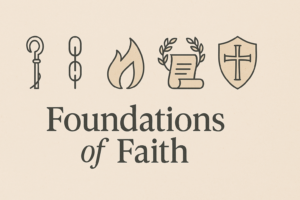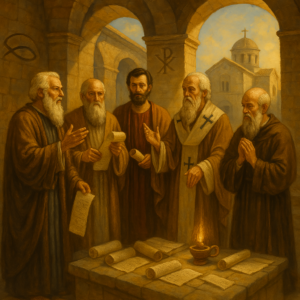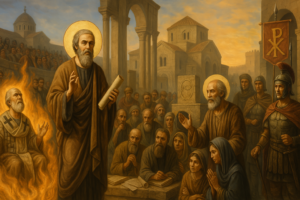Estimated reading time: 15 minutes
Key Takeaways
- The early church fathers were influential theologians who shaped early Christian doctrines.
- Their writings and teachings provide insights into the development of core Christian beliefs.
- Key figures include Irenaeus, Justin Martyr, Ignatius of Antioch, Polycarp of Smyrna, Tertullian, and Origen.
- Their works addressed heresies, defended Christianity, and defined theological discourse.
- The early church fathers’ beliefs continue to influence Christian theology today.
Introduction to Early Church Fathers
The early church fathers were remarkable individuals who shaped Christianity as we know it today. These notable theologians, ecclesiastical leaders, and scholars played crucial roles in establishing and consolidating early Christian doctrines and principles. Their wisdom continues to guide believers centuries after their time on earth ended.
These founding figures weren’t simply religious leaders. They were deep thinkers, passionate defenders of faith, and skilled writers who articulated complex spiritual concepts during Christianity’s formative years.
Their writings and teachings provide incredible insights into how key Christian theological doctrines evolved. Through their work, we can trace the development of core beliefs that millions of Christians around the world still hold dear today.
As Christianity spread throughout the ancient world, these scholarly saints helped define what it meant to be Christian amid competing philosophies and religious traditions. Their influence remains foundational to Christian theology across denominations.
History of the Early Church Fathers
The history of the early church fathers spans several centuries of dynamic theological development. This remarkable period began with men like Clement of Rome, the first of the Apostolic Fathers who died around 97 AD, and extended to theological giants like St. Augustine, one of Christianity’s most influential thinkers who died in 430 AD.
This timeline can be divided into several important periods:
- Apostolic Fathers (late 1st to early 2nd century) – These were direct disciples of the Apostles who carried forward the first-hand teachings they received.
- Ante-Nicene Fathers (before 325 AD) – These theologians worked before the Council of Nicaea and established early doctrinal foundations.
- Post-Nicene Fathers (after 325 AD) – These scholars further developed Christian thought following the council’s important doctrinal decisions.
The early church fathers operated in a world that was often hostile to Christian beliefs. Many faced persecution, exile, or martyrdom for their faith. Despite these challenges, they produced extensive writings that clarified Christian theology and defended it against various heresies and misunderstandings.
Their collective work helped transform Christianity from a small Jewish sect into a coherent religious tradition with established doctrines, practices, and organizational structures that could withstand cultural pressures and philosophical challenges.
Key Figures Among the Early Church Fathers
Irenaeus’ Writings Against Heresies
Irenaeus of Lyons (130-202 AD) stands as one of the most important early defenders of orthodox Christianity. His writings, particularly his landmark work “Against Heresies”, provided a comprehensive critique and refutation of Gnosticism, a movement that threatened early Christian teaching.
Born in Smyrna (modern Turkey), Irenaeus studied under Polycarp, who himself had learned from the Apostle John. This direct connection to apostolic teaching gave Irenaeus’s work special authority.
In “Against Heresies,” Irenaeus methodically exposed Gnostic beliefs that claimed:
- Special secret knowledge was needed for salvation
- The material world was evil and created by a lesser god
- Jesus only appeared to be human but wasn’t actually flesh and blood
Irenaeus countered these ideas by emphasizing:
- The goodness of creation
- The unity of the Old and New Testaments
- The reality of Jesus’s physical incarnation
- The importance of apostolic succession
His detailed analysis of Gnostic teachings gives historians valuable insight into these alternative religious movements that might otherwise be lost to history. Beyond merely criticizing, Irenaeus presented a positive vision of Christian doctrine that helped establish theological norms.
Justin Martyr’s Apologetic Works
Justin Martyr (100-165 AD) was one of Christianity’s earliest and most eloquent defenders. A philosopher by training, he used reason to explain and justify Christian beliefs to the Roman world. His writings bridge the gap between Greek philosophy and Christian theology.
Born in Samaria to pagan parents, Justin studied various philosophical systems before embracing Christianity as the “true philosophy.” Rather than abandoning his philosophical training, he used it to articulate Christian truths.
His most famous work, the “First Apology”, addressed directly to Emperor Antoninus Pius, represents one of the earliest formal defenses of Christianity. In this pioneering text, Justin:
- Defended Christians against false accusations of immorality and atheism
- Explained Christian ethics and worship practices
- Connected Old Testament prophecies to Jesus Christ
- Described early Christian baptism and Eucharistic celebrations
- Appealed to reason and justice in seeking fair treatment for Christians
Justin’s approach was revolutionary. Instead of hiding Christian practices, he openly described them to dispel rumors. His willingness to engage with Greek philosophy opened pathways for intellectual conversations about Christianity.
Justin’s commitment to his faith ultimately led to his martyrdom in Rome, where he was beheaded for refusing to sacrifice to Roman gods.
Writings of Ignatius of Antioch
Ignatius of Antioch (35-108 AD), as an early bishop of the church in Antioch, produced some of Christianity’s most passionate and urgent writings. His seven authentic letters, written while being transported to Rome for execution, provide remarkable insights into early church structure and theology.
What makes Ignatius’s letters especially valuable is their context – written by a man facing imminent martyrdom, they reveal what he considered most important to communicate to the churches before his death.
Key themes in Ignatius’s writings include:
- Church unity – He repeatedly urged believers to remain united around their bishop
- Apostolic authority – He emphasized the importance of respecting church leadership
- The sacraments – He called the Eucharist “the medicine of immortality”
- The nature of Christ – He affirmed both Christ’s divinity and humanity against early heresies
- Martyrdom – He viewed his own coming death as a way to imitate Christ
Ignatius coined the term “Catholic Church” (meaning universal), which first appears in his letter to the Smyrnaeans. His writings also show that a three-fold ministry of bishops, priests, and deacons was already developing by the early second century.
His passionate, sometimes almost mystical language differs from the more measured tones of many later church fathers, giving modern readers direct access to the fervent faith of early Christianity.
For more on Ignatius’s writings, visit Early Christian Writings.
Writings of Polycarp of Smyrna
Polycarp of Smyrna (69-155 AD) represents a crucial link between the apostolic age and the developing church. As a direct disciple of the Apostle John and bishop of Smyrna, his writings carry special significance for understanding how apostolic teaching was preserved and transmitted.
Though Polycarp’s only surviving authentic work is his Letter to the Philippians, we also have “The Martyrdom of Polycarp,” a detailed account of his death written by his church shortly afterward. This remarkable document is considered the earliest authentic account of Christian martyrdom outside the New Testament.
In his Letter to the Philippians, Polycarp:
- Emphasized practical Christian ethics and behavior
- Warned against false teachers and doctrines
- Encouraged proper church order and respect for church leaders
- Quoted extensively from the New Testament, showing which books were respected as authoritative
“The Martyrdom of Polycarp” describes how the 86-year-old bishop faced death with remarkable courage. When ordered to renounce Christ, he famously replied, “Eighty-six years I have served him, and he has done me no wrong. How can I blaspheme my King and Savior?”
This account became a model for later Christian martyrdom literature. It shows how early Christians viewed martyrdom not as a tragedy to be avoided at all costs, but as a glorious opportunity to follow Christ’s example of sacrifice.
Read more at New Advent.
Tertullian and Origen’s Theological Contributions
Tertullian (155-220 AD) and Origen (184-253 AD) represent two of early Christianity’s most brilliant but contrasting minds. Their work illustrates the theological diversity within early Christianity and shows how different approaches contributed to doctrinal development.
Tertullian, often called the “Father of Latin Theology,” was the first major Christian writer to produce an extensive body of work in Latin rather than Greek. A skilled lawyer before his conversion, he brought precise terminology and logical arguments to Christian theology.
Tertullian’s major contributions include:
- Coining theological terms like “Trinity” and “person”
- Developing the concept that heresy represents a later corruption of original apostolic truth
- Articulating a rigorous moral vision for Christian life
- Creating the classic formula for describing Christ’s nature as “one person with two natures”
Origen, by contrast, was a speculative thinker and biblical scholar from Alexandria, Egypt. His work laid the groundwork for future biblical scholarship and theological exploration.
Origen’s key contributions include:
- Developing systematic biblical interpretation methods
- Creating the Hexapla, a massive comparison of six versions of the Old Testament
- Exploring theological questions with philosophical sophistication
- Writing the first comprehensive systematic theology in “On First Principles”
Both men eventually embraced some opinions that later church councils would reject. Tertullian joined the Montanist movement, which claimed new prophetic revelations, while Origen’s speculations about pre-existent souls and universal salvation were later condemned.
Despite these controversies, both figures demonstrate the intellectual vitality of early Christianity and its ability to engage with the philosophical and cultural questions of its time.
Learn more about these thinkers at FreedomGPT Wiki.




